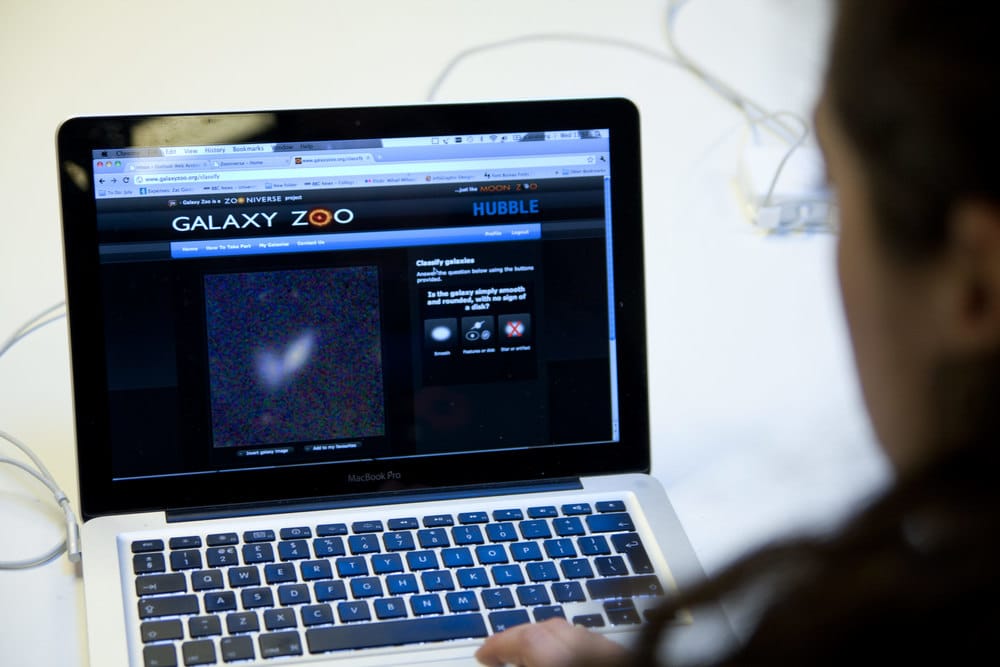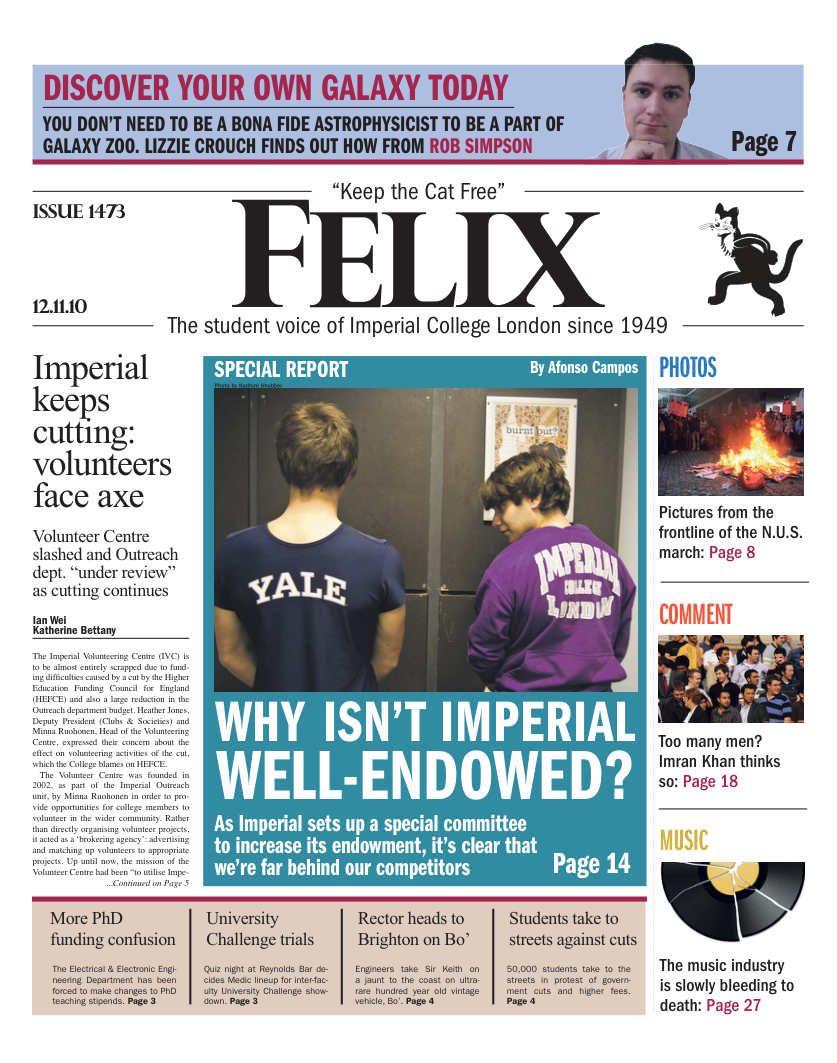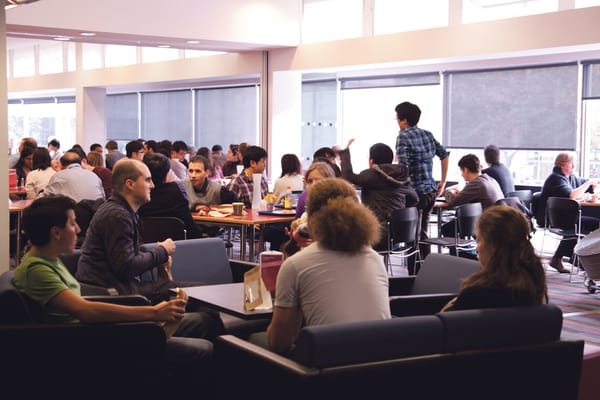Surfing the Zooniverse
Lizzie Crouch chats to Rob Simpson and gets addicted to galaxy classification as she tries her hand at citizen science

A grainy picture pops up in front of me. It’s an unimpressive sight. On the right of the picture a simple question pops up, “Is the galaxy simply smooth and rounded, with no sign of a disk?” I’m given 3 options; I click the one which best suits the blob in front of me. I answer a couple more questions and that’s it, I’ve officially classified a galaxy.
It’s simple and requires only a basic amount of decision making; I am in disbelief that people spend hours of their day doing it. However, half an hour later I am still classifying galaxies; moving quickly through the less impressive, blob-like ones in search of the elaborate ones, the beautiful ones, and the weird ones. My essay is going to suffer for the discovery of Galaxy Zoo!
Galaxy Zoo is phenomenally successful. To date it has published over a dozen papers in science journals! The Zooniverse team behind Galaxy Zoo, Moon Zoo, and many more have successfully broken down complex tasks in an engaging format that draws people in and allows them to generate data for scientific research.
I get a chance to talk to talk to Rob Simpson, a member of the Zooniverse team. With a background in astronomy, he tells me how he enjoys being part of a different sort of science, a step away from the normal academic research path, and working in the exciting, growing area of citizen science.
One thing is puzzling me; why do people even give up their time for something they don’t even get a credit for? Rob explains that a survey was done of Galaxy Zoo participants and produced results that even he is sceptical of. Out of the various options fellow galaxy classifiers could have picked, the most common one was that they felt like that they are contributing to something. “Hard to believe, but true,” Rob tells me with real disbelief in his voice. He explains that, “There is a real gaming aspect [to the different zoos]”. It plays on people’s hobbies and adds a, perhaps unintentional, competitive twist.
The beauty is that there is real mutual learning; the public gets to explore the different types of galaxies out in the far reaches of space, while the scientists get vital data
The beauty is that there is real mutual learning; the public gets to explore the different types of galaxies out in the far reaches of space, while the scientists get vital data.
Galaxy Zoo is part of a growing number of research projects using volunteers to generate data, known as citizen science. Some people believe that this is just crowd sourcing; an out sourcing of data collection to members of the public. Rob believes that Zooniverse is not as it “tries to engage with people.” There are forums where people can discuss their findings. These discussions platforms have even led to new discoveries, such as the intriguingly named Hanny’s Voorwerp! This was spotted by a zoo member, Hanny van Arkel, a number of years ago and is now thought to be a portion of a gas-cloud, heated by the jet from a black hole!
Interesting discussion have arisen from other ‘zoos’. Their latest project, Old Weather, asks people to transcribe meticulous weather records from ships log books into databases. Boring? Maybe. But as well as looking at the weather data, people are able to track the journey of the ship around the globe and get to know the daily lives of the sailors on board. In the Old Weather forum people post comments such as, “It all feels like it’s happening there and then when you’re working through the logs. It’s a nice way of keeping their memories alive.” And more touchingly, when people have encountered a death aboard the ship, “Not the kind of thing I want to just ignore – it’s like I need to mourn their deaths again for myself.”
On the other hand, the forums do give people interested in conspiracy theories a platform to air their views. Although reluctant to give specific details, Rob tells me that people do use moon zoo to search the moon’s surface for evidence of a moon base while others scour the skies for evidence of UFOs. None have been found to date.
There is real value in citizen science projects such as these. Firstly the sheer scale of information that can be gathered from the public. Because they have no preconceived ideas about what the galaxies should be, they serve as more objective observers. “People can do things computers can’t,” Rob explains. In the case of Galaxy Zoo, a computer cannot carry out the same detailed visual identification that a person can. The amount of people carrying out this identification allows an average closer to the true result to be obtained and irons our any deliberate errors or differences in opinion.
In the case of Galaxy Zoo, a computer cannot carry out the same detailed visual identification that a person can
An interesting discussion is about the role of citizen science has recently appeared recently on the blog of Imperial lecturer, Dr Alice Bell. During the course of the discussion Chris Linott wrote that “the broader role of citizen science projects... is to provide examples, places where people can sample being an active participant in science.” Does this suggest that citizen science can bridge the gap between scientists and the public, and engage them on a new level? Something to think about!
So what’s the future for Galaxy Zoo? Rob’s currently working on a project which is a bit of pet of his. When he joined Galaxy Zoo earlier this year he suggested that he might develop a new zoo which plays on his background. Using infrared data from space telescopes participants will be invited to draw where they see bubbles of space dust; work which will be hopefully generate data on how stars form. Sounds intriguing, but in the meantime I am still sat in front of my computer classifying galaxy after galaxy!








